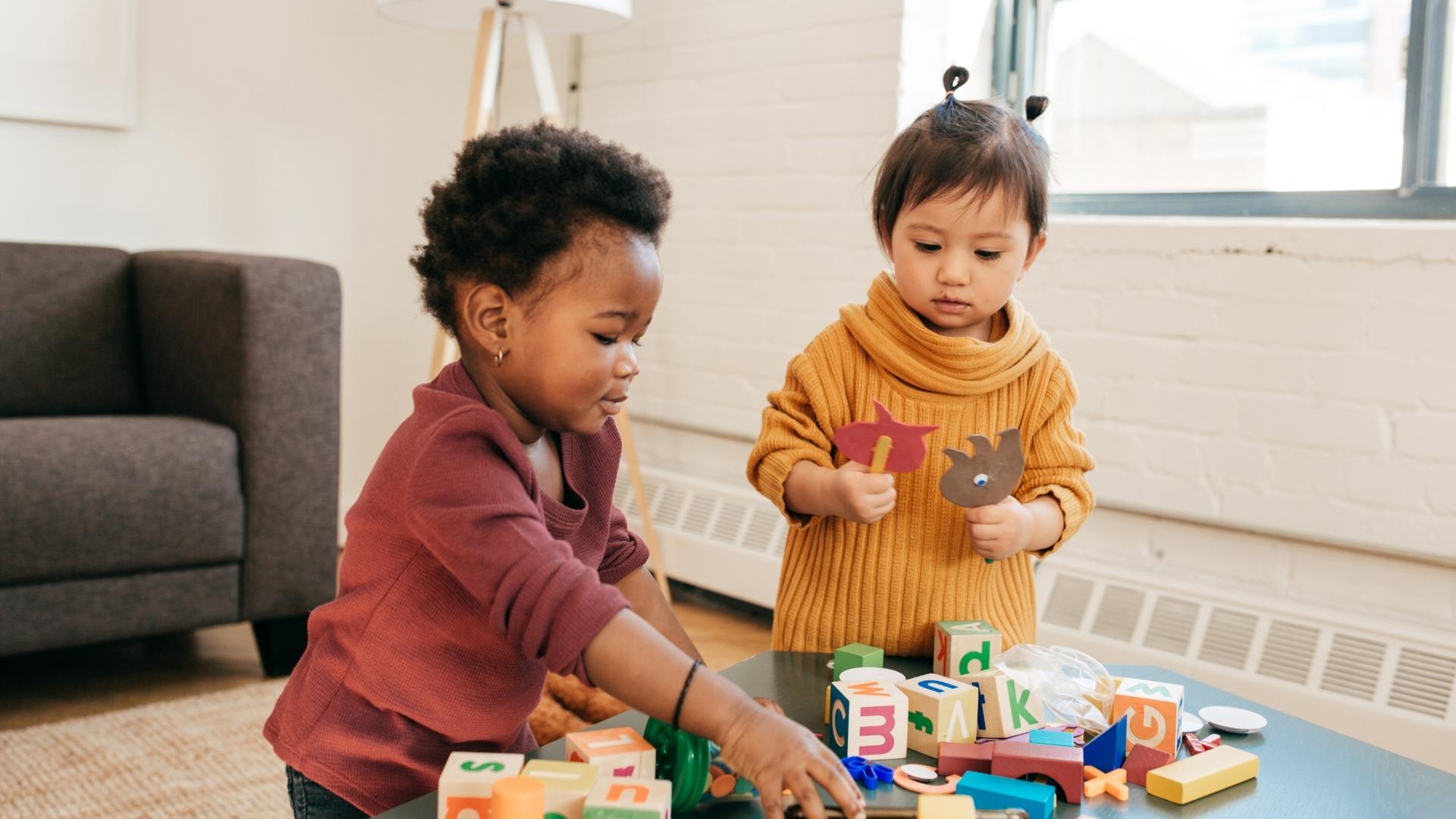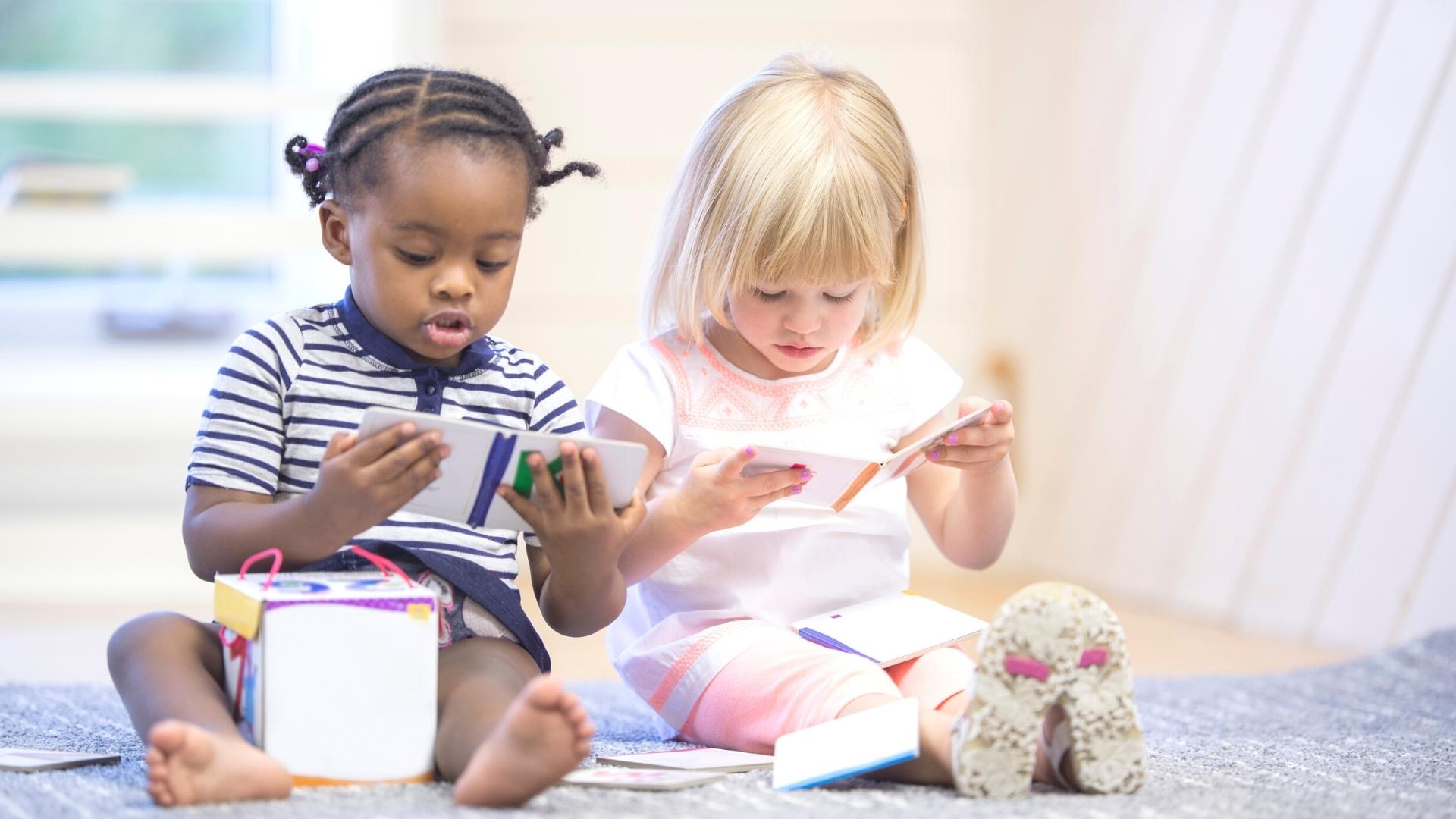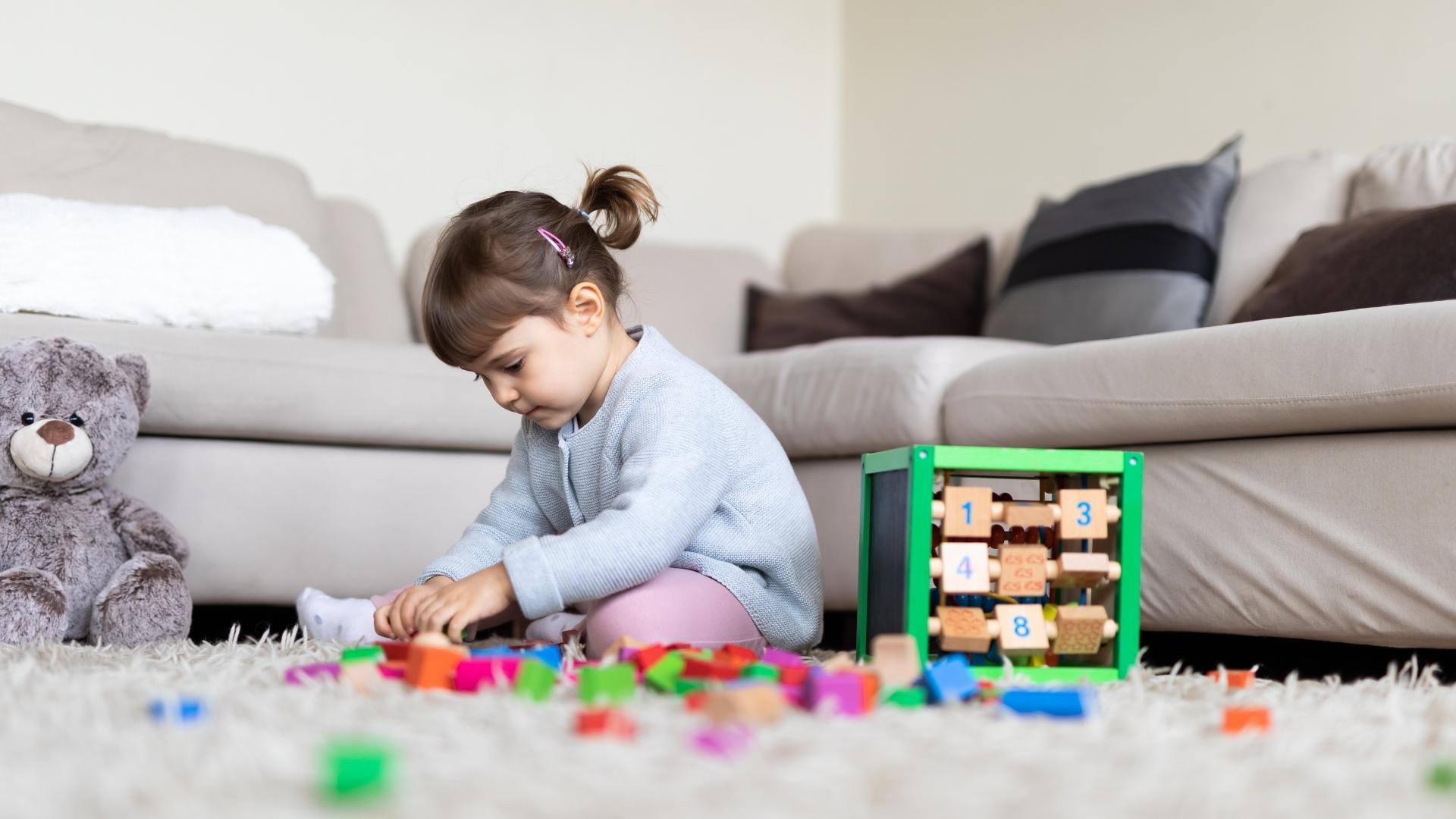Are you a parent who’s curious about your child’s development? Have you ever heard of cooperative play, but aren’t quite sure what it is or why it matters? Look no further! In this article, we’ll explore what cooperative is, when children typically engage in this type of play, and how it differs from other forms of play. Plus, we’ll share some examples of cooperative play and the main benefits it offers.
Cooperative Play Definition
Also known as social play, cooperative play is the 6th stage of play where your child interacts with others to work towards a common goal. They are able to follow rules and share, working together rather than being motivated solely by their individual needs and desires.
What Are The Characteristics Of Cooperative Play?
Cooperative play is characterised when children do the following:
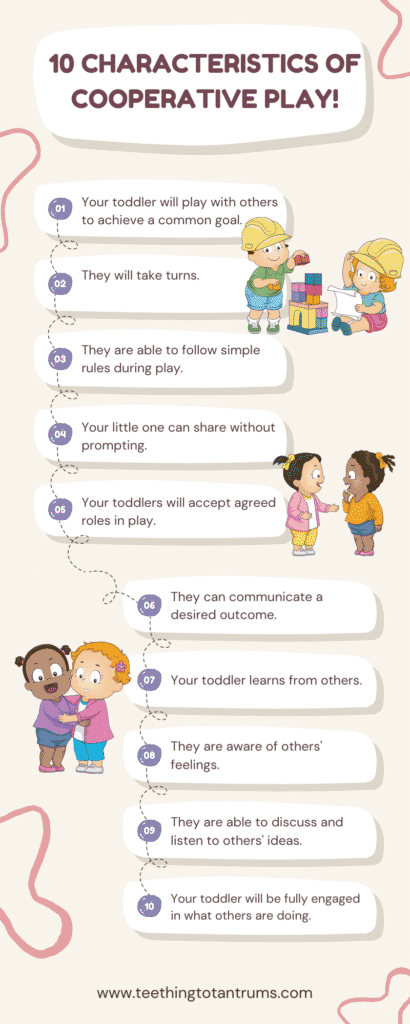
- Children will play together to achieve a common goal,
- They will practise taking turns,
- They will follow simple rules,
- Your child will begin to share without prompting,
- Children will accept the agreed roles during a play session,
- They will begin to communicate a desired outcome to the group,
- Your child will be learning from others,
- They will be aware of others’ feelings,
- They will discuss and listen to others’ ideas,
- Children will also play together and be fully aware and engaged in what other children are doing.
Why Is Cooperative Play Important?
Cooperative play is very important for children as it will form the foundation from which all future social interactions with others will be built. It is also the play stage at which the first meaningful friendships with peers will start to develop.
It has been proven that children who are given the opportunity to engage in this type of play are more likely to succeed socially and academically at school and be less aggressive or withdrawn in a social setting and have stronger listening skills, emotional skills and communication skills.
In short, cooperative play is the ground roots from which social skills will grow.
Cooperative Play Age Range
Typically, young children will show signs of cooperative play at around 4 years of age and up. They will still engage in the previous stages of play from time to time, however, after their 5th birthday, they will play in a cooperative fashion most of the time.
The Six Stages Of Play Recap
Here’s a quick recap of the 6 types of play you can expect your little one to engage with during the early years.
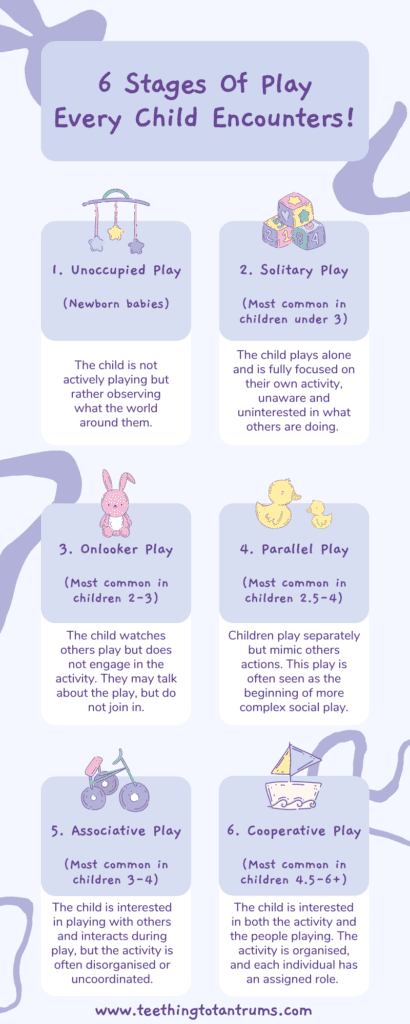
- Unoccupied Play (0-3 months)
- Solitary Play (most common in children under 3 years)
- Onlooker Play (most common in children aged 2-3 years)
- Parallel Play (most common in children aged 2.5-4 years)
- Associative Play (most common in children aged 3-4 years)
- Cooperative Play (most common in children aged 4.5-6+ years)
To learn more about Mildred Parten’s 6 stages of play, I’ve written an in-depth post talking about each stage and why they’re important for children. So be sure to check that out after reading this post.
What Is The Difference Between Parallel And Cooperative Play?
Some parents often wonder what the difference is between parallel and cooperative play…
Well, parallel play is when children play alongside each other and are aware of what the other children are doing, but they will not work together towards a common goal.
Children engaging in parallel play will enjoy being around other children but are not yet ready to share their toys or take turns willingly.
The link between parallel play and cooperative play is associative play.
This is where children will play with each other in a disorganised fashion… again with no common purpose or outcome in mind.
When they finally progress to cooperative play, you will notice that your child will be able to communicate their desired outcome and play as part of a group, working together on an activity to achieve a common goal.
Cooperative play becomes more focused and organised with collaboration as its main focus rather than self-interest.
What Is The Difference Between Social Play and Cooperative Play?
Social play and cooperative play are commonly interchanged in the parenting world. And at their core, they are very similar.
However, some experts, myself included, believe that social development begins from the day your baby is born.
This is because your newborn baby will interact with you when you talk and make eye contact with them and they coo and smile in return. Therefore, you are engaging them on a social level and they will be getting a positive response to their interaction with you.
Despite this, what we typically understand as ‘social play’ will not truly begin to develop until your child reaches the cooperative play stage.
As it is here that they will learn to master the skills required to thrive in social situations such as sharing, taking turns, compromising and communicating their ideas effectively.
Looking to get your little one to sleep quickly and effortlessly? Check out my Bedtime and Nap Cheat Sheet and master the art of making daytime naps and bedtimes as seamless as possible.
A bedtime & nap cheat sheet so good your little one will ask you to put them to bed...
Laura Williams "This is a life saver! I'm so glad I downloaded your bedtime & nap cheat sheet. My little one actually asked me to put him to bed last night! Unbelievable! Thank you so much!"
Click Here For The FREE Cheat Sheet
Cooperative Play Benefits
Through cooperative play, children will benefit from learning the following social skills:
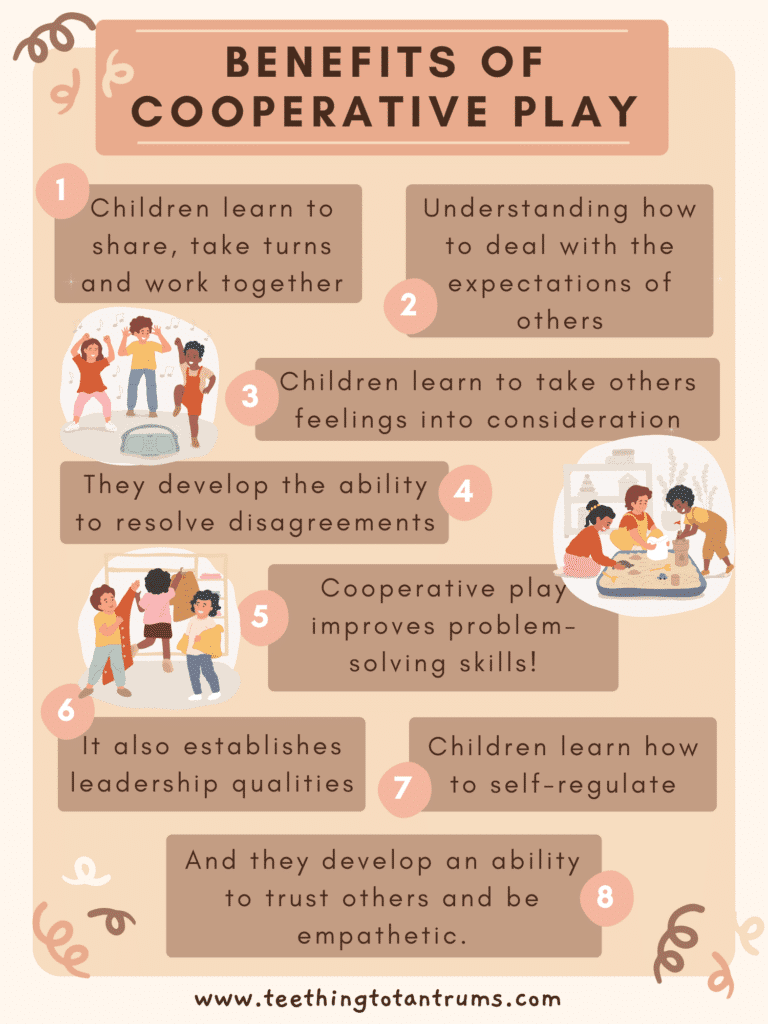
- Learning how to share, work together and take turns.
- Dealing with the expectations of other children and playmates.
- Taking the feelings of others into consideration by listening to what they have to say and creating a plan that everyone is happy with.
- Developing the ability to resolve disagreements (which may not always be successful in the beginning).
- Improving their problem-solving skills as they learn how to compromise and adapt to the needs of others to fit the activity.
- Establishing leadership qualities through developing language and cognitive skills.
- Teaching self-regulation as they learn to put others before themselves.
- Developing their ability to trust others and to understand the concept of empathy.
Cooperative Play Activities and Examples
As parents, we can encourage cooperative play by simply providing the right play opportunities and cooperative games.
As with all stages of play, it takes practice, so ensuring that you give your child the time and opportunities to play with others is hugely important.
Try the following cooperative play games:
- Set up playdates. Engaging with other children on playdates, at mother and toddler groups, playgroups and nursery schools are all great ways to encourage your child to learn how to play cooperatively with others.
- Visit the park. Outdoor play activities are always great for toddlers and sharing playground equipment such as the swings and slides are also great ways to get your children to engage and cooperate with other children whilst also getting a dose of fresh air.
- Play board games. On rainy days, playing simple board games at home where your child learns how to abide by rules, use effective communication and take turns is a fun way to encourage cooperative play.
- Play hide and seek tag. Fun outdoor activities will always be a winner for young children. Encourage your child to establish the basic rules of the game with others and let them run wild.
- Play roleplay games. A dressing up box will add an extra level to your child’s language skills, negotiating and cooperative skills as they decide who will wear what during their role-play.
- Make a dance show. Need your children to burn off extra energy? Have some music to hand? Give them 10 minutes and encourage your children to work together to put on a dance show for you.
- Complete jigsaw puzzles together. Perfect for developing their cognitive and fine motor skills, working together on puzzles will also help your child to develop their ability to explain what they want and how they want to achieve the final shared goal.
- Build a den together. Let your children drag out cushions, blankets and stuffed toys to create a den together. Deciding what to make and where will off plenty of opportunities to develop their cooperation skills, negotiating and leadership skills.
- Create a treasure hunt. Set up by yourself, a treasure hunt will enable your children to work cooperatively to find the clues hidden around your house and garden to reach the end goal all whilst using their problem-solving skills.
- Cooking together. Perfect for playdates or quiet afternoons with their siblings… cooking simple recipes together such as cookies, blueberry muffins, soft pretzels or cheesy crackers, your little ones will be developing their language, fine motor and sharing skills every time. It also leads wonderfully to sharing at the table for dinner.
- Read books. During your everyday life, reading books to your child about sharing and processing their emotions will help them to understand how to manage these new play scenarios and social skills they will be encountering.
3 Common Concerns About Cooperative Play
Some children will take longer than others to start engaging in cooperative play. This is very normal however, it can lead to some parents worrying that their children are not moving forward socially.
So to put your mind at ease, here are the 3 most common concerns about cooperative play and my advice about the situation.
1. My Child Still Engages In A Lot Of Onlooker Play
It is perfectly normal for children to continue to engage in all the stages of play, even after they have reached the age and stage of development at which they can take part in cooperative play.
It is important to remember that all children develop at different rates and that continuing to engage in solitary, onlooker, parallel and associative play on occasion is a good thing.
Sometimes we all need a little bit of time to ourselves.
2. My Child Is Reluctant To Mix With Their Peers
If your child is reluctant to mix with other children… they may just be shy. Therefore, it may take them longer to start to engage comfortably with others. Allow them the space to go at their own rate.
3. My Child Stands On The Sideline And Observes Instead Of Getting Involved
If your child is standing to one side but showing interest in what other children are doing, allow them time to observe the room and offer to go with them to look at what others are doing. For some children, cooperative activities can be a little daunting.
However, with you at their side and engaging with the other children, they may feel confident enough to take part and interact with other children later.
If you are concerned about your child’s developing social skills, then you should consult your paediatrician who, if they think it is necessary, may refer you to a counsellor, child development specialist or play specialist.
The majority of children will progress through all 6 developmental stages of play eventually, but the pace at which they do so will vary from child to child and will be greatly determined by their personality.
Need More Parenting Help?
- Download our FREE Perfect Sleep Cheat Sheet. It’s a free, easy-to-use and proven formula designed for parents of 0-5 year olds to master the art of consistently undisturbed and restful sleep without the yelling, nagging or exhausting long-winded evenings.
- Check out our Parenting Toolbox. You’ll get access to expertly-chosen products that you can guarantee are the best for your little one and your wallet.
- Ready to create the calm, peaceful evenings you deserve? Then checkout our most popular course - The Bedtime Battles Masterclass

A bedtime & nap cheat sheet so good your little one will ask you to put them to bed...
Laura Williams "This is a life saver! I'm so glad I downloaded your bedtime & nap cheat sheet. My little one actually asked me to put him to bed last night! Unbelievable! Thank you so much!"
Click Here For The FREE Cheat Sheet
